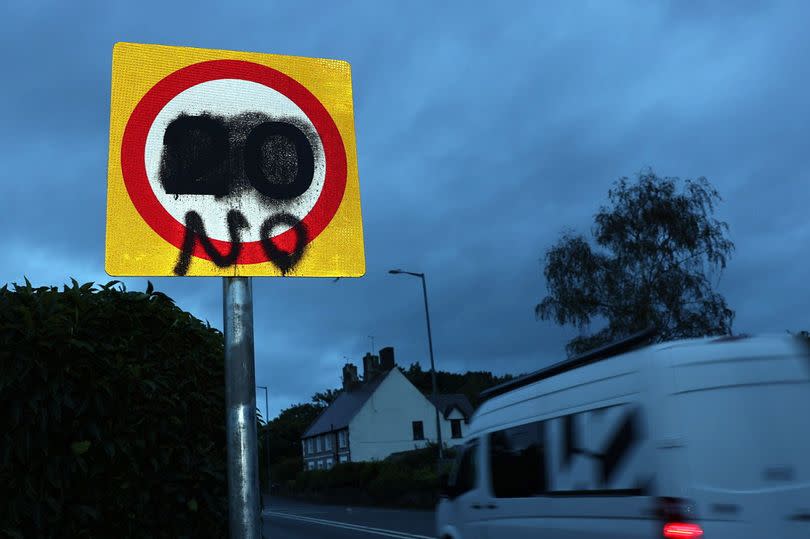We put the big questions on changes to the 20mph law to Wales' new transport minister Ken Skates

The Welsh Government has given details of its planned review of the 20mph speed limit across Wales. The "three stage" approach will see a "genuine listening exercise" where people are asked to give details of the roads they want to see change back from 20mph to 30mph.
The guidance councils have to use to enforce the policy will also be reworked. Ken Skates has replaced Lee Waters as the person in charge of the policy as part of Vaughan Gething's cabinet. He has admitted it will likely cost millions, on top of the £33m already spent, but could not say how many roads he expects to change.
He did however there will be changes all across Wales but he expects more roads to change in north, rather than south Wales. The leaders of Cardiff and Swansea councils have, respectively, said they expect six and ten changes to change in their council area.
READ MORE: The place where more people identify as English than anywhere else in the UK - is actually in Wales
READ MORE: Campaign finance to be looked at in review of Welsh Labour leadership election
Mr Skates admitted there were roads which should have remained at 30mph which should revert back. He denied that the roll-out in September 2023 had wasted money and said it was still cheaper to do it through national directive and then by exempting roads. You can read the details of the announcement, and his statement to the Senedd on Tuesday, April 23, here.
Ruth Mosalski: Is this a real review because lots of things you're talking about are things we've already heard, so talking to people, talking to councils, they were all things that had already been promised.
Ken Skates: This is definitely happening. I'm absolutely determined to ensure that by the end of the process that anybody who wants to be able to say something about roads where they live will be able to say it and their views will taken into account by the decision makers, which are the local authorities, the councils. To support people in being able to get their voices heard we're going to be engaging with town and community councils to make sure there are channels for people to make their views known and then there will also be an opportunity to do that through the Welsh Government website, and local authorities as well will have a means for people to make their views heard.
The revised guidance is going to be hugely important. Getting that right will enable those roads and routes that should have remained at 30 to revert back to 30 and to ensure we get the right guidance in place, we're going to recruit county surveyors to be part of a small panel to provide support and assurance to councils.
It's also a concern of mine that the tone of the debate has been very polarised and by and large, the vast majority of people agree that in certain areas, like outside schools, nurseries and community centres, and in built-up areas, outside play areas, 20 is working. Where 20 is working, it's working really well but also when I'm un the supermarket, on a train, in the gym or in the pub, or speaking with friends and family I hear exactly the same thing, time and time again, they believe in 20mph where they live but it's certain routes. I hear the same routes raised all the time where I live. There seems to be quite strong degree of unanimity in terms of people supporting 20mph in areas where people, particularly children and the elderly come into contact with vehicles, but on those arterial routes, those commuter routes we need to see change.
How many roads do you think are going to change?
It's difficult to say at this exact moment for two reasons. One is that the implementation has changed across Wales so some areas I think will change far more than others. The total numbers of roads that will revert back to 30 is very difficult to tell at the moment.
Huw Thomas [the leader of Cardiff council] has said he thinks it will be six roads, and Rob Stewart, leader of Swansea council, said it could be 10. That's tiny numbers. How is that a review?
They're amongst the councils that will likely have the fewest, for two reasons. Cardiff is intensely urban anyway, and lends itself better to 20mph than many other parts of Wales anyway. Swansea led the way in terms of exempting routes, they had more exemptions than any council in Wales.

So in which areas do you expect there to be bigger changes?
As a north Wales member I obviously spend a lot of time in north Wales and having spoken with people and councillors that probably we will see some of the largest numbers change in north Wales. We will see changes across Wales. It will vary but we will see changes across Wales.
A lot of these authorities have compiled with the guidance they were given last year, done the right thing, allocated resources and precious pounds. Within a year, you're saying to them 'some of that wasn't right, change it'.
We're putting up our hands and saying some of the guidance is interpreted and in terms of implemented wasn't sufficiently flexible enough for councils to be able to use their own discretion to maintain 30 where 30 works best.
Has this law wasted money and resources?
I'll talk about money and resources because that's a really interesting point in terms of the way forward. It's cost around £33m to implement. An individual traffic regulation order costs, in Cardiff, £3,500. If you were to turn a significant proportion of roads from 30 to 20 outside hospitals and schools it would cost, under any other policy £3,500 per route, per section. There's 148,000 streets in Wales. You can do the maths. So actually, if you reverted back to 30mph as a default and then went along the process of traffic regulation orders, the cost wouldn't be tens of millions but hundreds of millions. So, the cost of introducing 20mph routes in any other way would be far more expensive and people, by and large now, where they live accept that 20mph is suitable and there is popular support in those urban areas where people come into close contact with vehicles, whether schools or hospitals.
I know, if the policy were to be reversed, and we were to go back to 30mph, we would be inundated with requests from members across the chamber, including the Conservatives, for certain streets in their constituencies to revert back to 20mph. It would simply be impossible for councils to do that. It would be a bureaucratic nightmare tying them down for years, they don't have the money to spend £3,500 on every single road.
Think of the small village where I grew up. There are certain housing estates where 20mph is very popular, for each one it would be £3,500 or thereabouts. That community alone, you'd be looking at upwards of £20,000 to revert back those routes that people want to see at 20. So the best, easiest and most cost effective way of dealing with this policy is by asking the public what they believe should be done, getting the right guidance in place and moving at speed.
If you've had been in this job a year ago would you have brought in the law as it is now?
I don't know where I would have been a year ago in terms of knowing just how challenging the policy was to get right. I accept that people are angry over this in some parts, and very supportive in other parts. What I want to do is bring people together in the middle ground. There will always be some people who want to revert back and have no 20mph roads, I accept that is a reality. There are others who want to see more 20mph roads. My aim is to speak to the vast majority of people who believe 20mph is right outside schools and hospitals and residential areas but we need to make changes. Some of them should never have been changed to 20mph and should have been exempt.
The initial reaction to your comments was scepticism there would be real change, have you oversold this announcement?
No, I don't think so. I think first of all people will get to have their say. It will be people, communities who get to determine what roads should revert back to 30mph. I can't dictate, I can't direct, and that would be inappropriate to do so but I will ensure people have their say and will support councils in making whatever changes are required. I do expect the picture to vary across Wales. Some local authority areas there will be far more roads changing back to 30mph.
Are you providing more money or resources to councils for this?
Yes. We've accepted this is our policy and councils are facing really difficult challenges in terms of their budgets and we will find the money to pay for this.
What are we talking?
Nowhere near the cost of implementation mainly because it's going to be labour rather than the actual production of 30mph signs which are still available.
How long is this going to take?
The next steps are, over the next two months, listening to people, and drawing together revised guidance. Then from July to September interrogating the proposals for changes. From September onwards implementing those on the ground.
How quick can they be?
Three months.
When we will know the budget you've set aside for this? It sounds like you don't have a figure now.
We have an estimate.
Which is?
I wouldn't want to commit myself to that estimate, save to say it's considerably lower than the £30m.
Still millions?
It would likely still be millions.
Note: Immediately after this interview, Ken Skates admitted the cost of the changes would be somewhere in the region of £3m to 5m.

 Yahoo News
Yahoo News 
